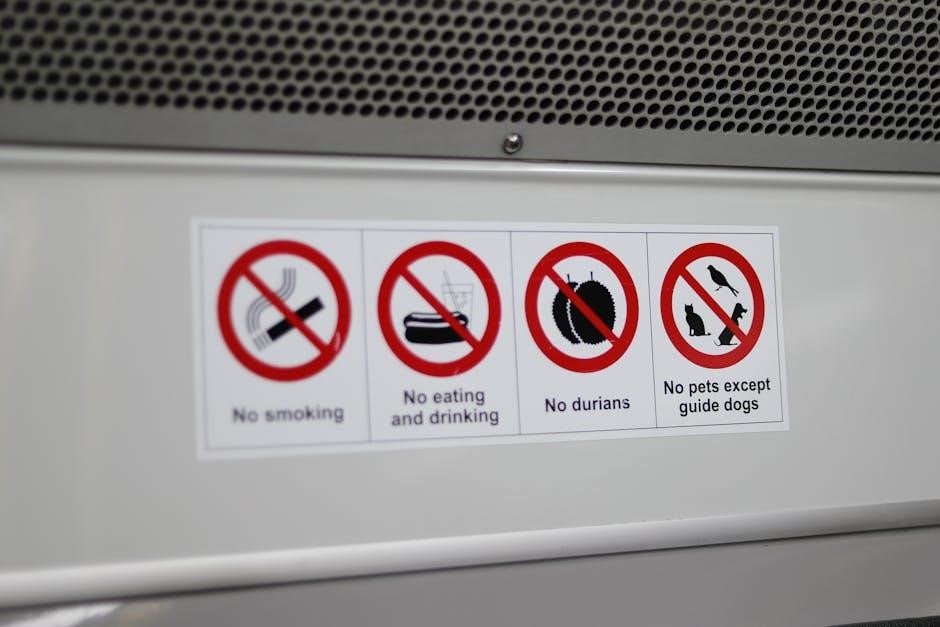Judiciary policy forms the backbone of governance‚ ensuring fair legal frameworks and impartial justice. It outlines the role of courts in interpreting laws and upholding the rule of law.
1.1. Definition and Scope of Judiciary Policy
Judiciary policy refers to the framework governing the judicial system’s operations‚ ensuring impartial justice and adherence to the rule of law. Its scope encompasses legal interpretations‚ court procedures‚ and the balance between justice delivery and societal needs‚ forming the foundation for fair governance and legal accountability.
1.2. Importance of Judiciary Policy in Governance
Judiciary policy is crucial for maintaining governance integrity‚ ensuring laws are applied consistently and impartially. It upholds the rule of law‚ protects constitutional rights‚ and fosters public trust‚ thereby stabilizing the legal and social order while providing a framework for resolving disputes and holding institutions accountable.

Structure of the Judiciary System
The judiciary system is organized into a hierarchical framework with defined roles for courts and judicial officers‚ ensuring efficient administration and impartial delivery of justice.
2.1. Hierarchy of Courts
The hierarchy of courts is structured to ensure efficient legal dispute resolution. It begins with lower courts‚ such as magistrate or small claims courts‚ handling minor cases. Above these are trial courts‚ which manage more complex civil and criminal matters. Appellate courts review lower court decisions‚ and the highest tier consists of supreme courts‚ interpreting constitutional and legal matters. Specialized courts‚ like family or bankruptcy courts‚ operate within this framework‚ ensuring specialized justice delivery.
2.2. Roles and Responsibilities of Judicial Officers
Judicial officers serve as impartial arbiters‚ ensuring the fair application of the law. Their roles include presiding over court proceedings‚ interpreting legal statutes‚ and rendering verdicts. They also manage case flow‚ maintain courtroom decorum‚ and uphold procedural integrity. Additionally‚ they may oversee alternative dispute resolution processes and ensure access to justice‚ contributing to public trust in the judicial system while adhering to ethical standards and legal principles.

Judicial Independence and Impartiality
Judicial independence ensures unbiased decision-making‚ free from external pressures. Impartiality guarantees fair treatment of all parties‚ safeguarding the integrity of the legal process and public trust in the judiciary.
3.1. Principles of Judicial Independence
Judicial independence is rooted in the separation of powers‚ ensuring judges are free from external influence. Key principles include impartiality‚ tenure security‚ and financial autonomy‚ safeguarding unbiased decisions and upholding the rule of law. These principles protect judges from political or societal pressures‚ fostering public trust and maintaining the integrity of the judicial system;
3.2. Challenges to Judicial Impartiality
Judicial impartiality faces challenges such as political interference‚ media influence‚ and societal biases. Judges must navigate complex cases while avoiding conflicts of interest. Additionally‚ underfunding and overburdened courts can strain impartiality. Public perception of fairness is also crucial‚ as mistrust can undermine the judiciary’s credibility and effectiveness in delivering unbiased justice.
Judicial Process and Procedures
The judicial process involves initiating cases‚ managing proceedings‚ and applying evidence rules to ensure fairness. Procedures guide court operations‚ ensuring adherence to legal standards and efficient dispute resolution.
4.1. Initiation and Management of Cases
The initiation of cases typically begins with the filing of a complaint or petition‚ followed by jurisdictional determinations. Courts manage cases through pre-trial motions‚ discovery processes‚ and scheduling orders. Effective case management ensures timely resolutions‚ reduces delays‚ and upholds procedural fairness. Courts may also employ alternative dispute resolution methods to streamline processes and alleviate caseload pressures‚ ensuring justice is served efficiently and impartially.
4.2. Rules of Evidence and Procedure
Rules of evidence and procedure govern how cases are conducted‚ ensuring fairness and consistency. Evidence must be relevant‚ reliable‚ and admissible under specific legal standards. Procedural rules outline the steps for presenting cases‚ from pleadings to trials. These rules maintain order‚ protect rights‚ and ensure impartial outcomes‚ forming the foundation for just and efficient judicial processes in both criminal and civil matters.
Judicial Reform and Modernization
Judicial reform and modernization aim to enhance efficiency and transparency. Technology integration‚ such as digital case management and virtual hearings‚ streamlines processes and improves access to justice.
5.1. Recent Reforms in Judiciary Policy
Recent reforms in judiciary policy have focused on enhancing transparency and efficiency. Digital case management systems and virtual hearings have been implemented to streamline processes. These changes aim to reduce delays and improve public trust. Additionally‚ measures to modernize legal frameworks ensure better alignment with contemporary societal needs and technological advancements‚ fostering a more accessible and equitable justice system.
5.2. Role of Technology in Judicial Modernization
Technology has revolutionized judicial systems by enhancing efficiency and accessibility. AI-driven tools analyze case data to predict outcomes‚ while e-filing systems streamline document management. Virtual court hearings reduce delays and expand access to justice. Digital evidence management ensures integrity and transparency. These innovations not only modernize court processes but also strengthen fairness and accountability‚ preparing the judiciary for future challenges and evolving legal landscapes.
Judiciary and the Rule of Law
The judiciary upholds the rule of law by interpreting legislation impartially‚ ensuring fairness and justice in governance and societal accountability through legal frameworks.
6.1. Upholding the Rule of Law
The judiciary ensures the rule of law by interpreting legislation impartially‚ safeguarding individual rights‚ and maintaining societal order. Courts enforce legal frameworks‚ resolve disputes‚ and hold entities accountable‚ fostering trust and stability in governance systems. This role is crucial for democracy‚ as it guarantees fairness and justice‚ upholding constitutional principles and public trust in the legal system.
6.2. Judiciary as a Guardian of Constitutional Rights
The judiciary acts as a protector of constitutional rights by interpreting and enforcing legal provisions that safeguard individual freedoms. Courts ensure that laws align with constitutional principles‚ preventing government overreach and protecting citizens from rights violations. This function is vital for maintaining democracy and ensuring that the rights enshrined in the constitution are upheld‚ fostering justice and equality within society.

Judiciary and Public Trust
The judiciary fosters public trust by ensuring transparency and accountability in its processes‚ which are essential for maintaining fairness‚ integrity‚ and confidence in the legal system and upholding justice.
7.1. Enhancing Public Confidence in the Judiciary
Public confidence in the judiciary is strengthened through transparency‚ impartiality‚ and accountability. Open court proceedings‚ clear communication of decisions‚ and accessible information foster trust. Educational outreach and engagement with communities further enhance understanding and confidence in judicial processes‚ ensuring the public perceives the judiciary as fair and reliable guardians of justice and legal principles.
7.2. Transparency and Accountability in Judicial Proceedings
Transparency and accountability are crucial for maintaining integrity in judicial proceedings. Open access to court records‚ live-streamed hearings‚ and detailed case reports ensure visibility. Accountability measures‚ such as judicial performance reviews and ethical oversight‚ promote trust and fairness‚ ensuring that the judiciary remains answerable to the public while upholding the highest standards of justice and legal integrity.
Judiciary Policy in Comparative Perspective
Judiciary policy varies globally‚ reflecting diverse legal systems and cultural contexts. Comparative analysis reveals differences in court structures‚ legal frameworks‚ and adaptability to societal changes.
8.1. Global Trends in Judiciary Policy
Global trends in judiciary policy emphasize judicial independence‚ transparency‚ and modernization. Many nations are adopting technology-driven solutions to improve efficiency‚ while others focus on strengthening rule of law frameworks. Comparative studies highlight the importance of adapting judicial systems to address emerging challenges and ensure fair governance across diverse legal landscapes and cultural contexts.
8.2. Comparative Analysis of Judiciary Systems
A comparative analysis of judiciary systems reveals diverse approaches to legal frameworks‚ judicial independence‚ and dispute resolution. Common law systems‚ like those in the UK and US‚ emphasize judicial precedent‚ while civil law systems‚ prevalent in Europe‚ rely on codified statutes. Such comparisons highlight differences in court structures‚ procedural efficiencies‚ and the role of judiciary in upholding constitutional principles across nations.

Challenges Facing the Judiciary
The judiciary faces challenges like case backlogs‚ funding shortages‚ and maintaining impartiality amid political pressures‚ all of which hinder its efficiency and public trust.
9.1. Overburdened Court Systems
Court systems globally struggle with overwhelming caseloads‚ leading to delays in justice delivery. Limited resources‚ insufficient staffing‚ and complex legal procedures exacerbate these challenges‚ affecting the judiciary’s efficiency and public trust. This overload strains the system‚ potentially compromising the quality of judicial outcomes and the timely resolution of disputes‚ which are critical for upholding the rule of law and ensuring fairness.
9.2. Ethical and Professional Challenges
Ethical dilemmas‚ such as conflicts of interest and bias‚ pose significant challenges to judicial integrity. Maintaining impartiality while adhering to legal and moral standards is crucial. Professional challenges include ensuring continuous education for judges and addressing public perceptions of accountability. These issues require robust oversight mechanisms and transparent processes to uphold trust and ensure the judiciary remains a pillar of fairness and justice in society.
Future of Judiciary Policy
The future of judiciary policy lies in embracing technology‚ enhancing transparency‚ and reforms that strengthen judicial independence and public trust‚ ensuring equitable justice for all society members.
10.1. Emerging Issues and Trends
Emerging issues include the integration of artificial intelligence in legal processes‚ digital court systems‚ and data privacy concerns. These trends require judicial systems to adapt swiftly while maintaining integrity and public trust. Additionally‚ global challenges like cybercrime and cross-border legal disputes demand innovative approaches to ensure justice remains accessible and fair for all individuals.
10.2. Vision for the Future of Judicial Systems
The future of judicial systems envisions streamlined‚ technology-driven processes‚ enhancing efficiency and transparency. Courts will leverage AI for faster decisions‚ ensuring impartiality and fairness. Digital platforms will improve accessibility‚ reducing delays and costs for litigants. A focus on public trust and modernization will shape judicial systems‚ making them more responsive to societal needs while upholding the rule of law.

